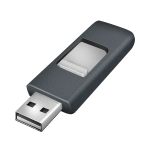Rufus is a popular, lightweight, and free utility program that helps users create bootable USB flash drives. Developed by Pete Batard, it is one of the most reliable tools for creating USB installation media for various operating systems, including Windows, Linux, and UEFI bootable ISOs.
The program is known for its simplicity and high performance, being significantly faster than many similar tools. Rufus supports multiple formats and file systems, including FAT32, NTFS, and exFAT. It can also format drives, check them for bad blocks, and create DOS-bootable drives.
One of Rufus's main advantages is its small size (less than 2MB) and the fact that it doesn't require installation – it runs directly as a portable application. The program is regularly updated and has become a go-to solution for IT professionals and regular users who need to create bootable USB drives.
Despite its simple interface, Rufus offers advanced features and options for experienced users while remaining user-friendly enough for beginners. It's compatible with all versions of Windows from XP onwards and is completely free and open-source software.
| Rufus Overview | |
|---|---|
| General Information | |
| Full Name | Rufus (Reliable USB Formatting Utility with Source) |
| Developer | Pete Batard (Akeo) |
| Initial Release | 2011 |
| Latest Version | 4.3 (as of 2023) |
| License | GNU General Public License v3 |
| Operating System | Windows XP and later versions |
| File Size | Approximately 1.3 MB |
| Programming Language | C |
| Official Website | rufus.ie |
| Main Features | |
| Main Features | • Creates bootable USB drives • ISO to USB conversion • Formats USB drives • Creates Windows installation media • Supports various file systems • Low-level drive formatting |
| Supported File Systems | |
| Supported File Systems | • FAT32 • NTFS • exFAT • UDF • ReFS |
| Boot Types | |
| Boot Types | • UEFI • BIOS (Legacy) • Hybrid UEFI+BIOS |
| Key Functions | |
| Key Functions | • ISO image writing • Disk cloning • Bad blocks check • Quick formatting • Full formatting • Custom partition schemes |
| Supported Media | |
| Supported Media | • USB drives • Memory cards • Flash drives • External HDDs/SSDs |
| Maximum Size Support | |
| Maximum Size Support | • Up to 16TB devices • Individual files up to 4GB (FAT32) • No file size limit (NTFS) |
| Special Features | |
| Special Features | • Portable application (no installation required) • Command-line support • Multiple language support • Custom boot sector code • GPT/MBR partitioning |
| Security Features | |
| Security Features | • SHA-256 verification • Write protection options • Secure formatting |
| Interface Languages | |
| Interface Languages | 38+ languages supported |
| System Requirements | |
| System Requirements | • Windows XP or later • Admin rights • .NET Framework (for some features) • Minimum 64MB RAM |
| Common Use Cases | |
| Common Use Cases | • Creating Windows installation media • Linux distribution installation • BIOS updates • System recovery tools • Disk formatting |
| Advantages | |
| Advantages | • Small file size • Fast operation • Reliable performance • Regular updates • Free and open-source |
| Limitations | |
| Limitations | • Windows-only • Requires admin rights • Single drive operations only |

